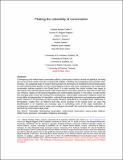Files in this item
Plotting the coloniality of conservation
Item metadata
| dc.contributor.author | Collins, Yolanda Ariadne | |
| dc.contributor.author | Macguire-Rajpaul, Victoria | |
| dc.contributor.author | Krauss, Judith E. | |
| dc.contributor.author | Asiyanbi, Adeniyi | |
| dc.contributor.author | Jiménez, Andrea | |
| dc.contributor.author | Bukhi Mabele, Matthew | |
| dc.contributor.author | Alexander-Owen, Mya | |
| dc.date.accessioned | 2022-05-10T10:30:27Z | |
| dc.date.available | 2022-05-10T10:30:27Z | |
| dc.date.issued | 2021-11-13 | |
| dc.identifier | 276738391 | |
| dc.identifier | 054100d9-c269-4ff2-9a7c-6a62b8f6d86d | |
| dc.identifier | 000719591000001 | |
| dc.identifier | 85124203037 | |
| dc.identifier.citation | Collins , Y A , Macguire-Rajpaul , V , Krauss , J E , Asiyanbi , A , Jiménez , A , Bukhi Mabele , M & Alexander-Owen , M 2021 , ' Plotting the coloniality of conservation ' , Journal of Political Ecology , vol. 28 , no. 1 . https://doi.org/10.2458/jpe.4683 | en |
| dc.identifier.issn | 1073-0451 | |
| dc.identifier.other | ORCID: /0000-0003-4138-9158/work/104252841 | |
| dc.identifier.uri | https://hdl.handle.net/10023/25334 | |
| dc.description | Funding: NORFACE/Belmont Forum (ES/S007792/1). | en |
| dc.description.abstract | Contemporary and market-based conservation policies, constructed as rational, neutral and apolitical, are being pursued around the world in the aim of staving off multiple, unfolding and overlapping environmental crises. However, the substantial body of research that examines the dominance of neoliberal environmental policies has paid relatively little attention to how colonial legacies interact with these contemporary and market-based conservation policies enacted in the Global South. It is only recently that critical scholars have begun to demonstrate how colonial legacies interact with market-based conservation policies in ways that increase their risk of failure, deepen on-the-ground inequalities and cement global injustices. In this article, we take further this emerging body of work by showing how contemporary, market-based conservation initiatives extend the temporalities and geographies of colonialism, undergird long-standing hegemonies and perpetuate exploitative power relations in the governing of nature-society relations, particularly in the Global South. Reflecting on ethnographic insights from six different field sites across countries of the Global South, we argue that decolonization is an important and necessary step in confronting some of the major weaknesses of contemporary conservation and the wider socio-ecological crisis itself. We conclude by briefly outlining what decolonizing conservation might entail. | |
| dc.format.extent | 241523 | |
| dc.language.iso | eng | |
| dc.relation.ispartof | Journal of Political Ecology | en |
| dc.subject | Indigenous knowledges | en |
| dc.subject | Coloniality | en |
| dc.subject | Decolonizing conservation, market-based conservation | en |
| dc.subject | Nature-society relations | en |
| dc.subject | Global South | en |
| dc.subject | Pluriverse | en |
| dc.subject | Conviviality | en |
| dc.subject | JZ International relations | en |
| dc.subject | 3rd-DAS | en |
| dc.subject | AC | en |
| dc.subject.lcc | JZ | en |
| dc.title | Plotting the coloniality of conservation | en |
| dc.type | Journal article | en |
| dc.contributor.institution | University of St Andrews. School of International Relations | en |
| dc.contributor.institution | University of St Andrews. Centre for Global Law and Governance | en |
| dc.identifier.doi | 10.2458/jpe.4683 | |
| dc.description.status | Peer reviewed | en |
This item appears in the following Collection(s)
Items in the St Andrews Research Repository are protected by copyright, with all rights reserved, unless otherwise indicated.

